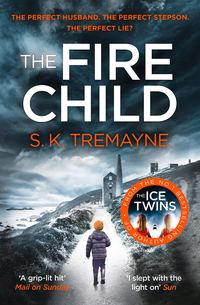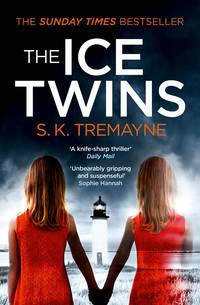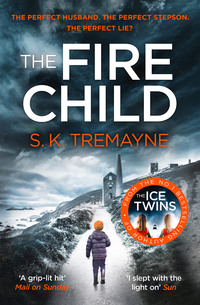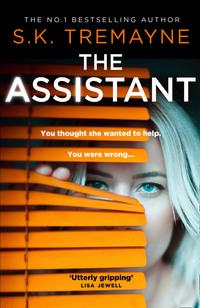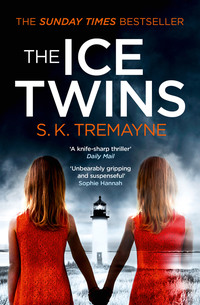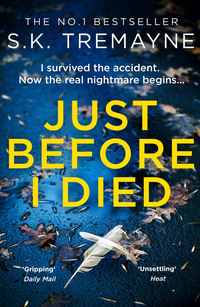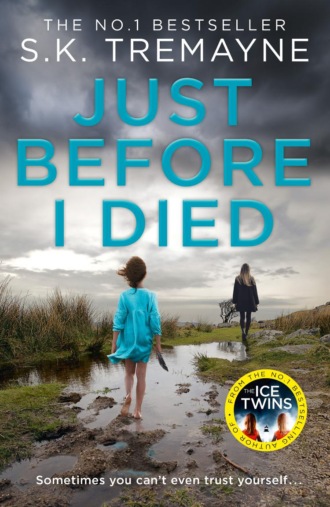
Полная версия
Just Before I Died: The gripping new psychological thriller from the bestselling author of The Ice Twins
‘Hey, sweetpea. From now on I’ll be able to take you to school again, isn’t that good?’
She says nothing. Her face is averted. She is gently tapping the window with her fingernails. I don’t know why she does this. Perhaps it’s another sound she likes. She calls them tinkly-tankly sounds. Crackling, jingling, light metallic sounds, things like the silvery rattle of coins, or keys.
My daughter once told me, when we stood in the summer hayfields over Buckfast, how she loved the sound of butterflies.
There are also sounds that she hates. City sounds. Traffic. Sirens. The jostle of people in crowds. It’s one of the reasons we moved to the remoteness of Huckerby.
‘Lyla?’
She turns, her blue eyes wide. Distant. ‘Mmm?’
‘Did you hear what I said?’
A shake of her head. She offers me a reserved frown: as if I’ve done something wrong, but she is too polite to say. I feel a pang of pity. She is a nine-year-old girl with troubles and issues and dreams, and laughter I sometimes do not quite hear; she’s a girl who has personal names for flies and rocks and frogs, who collects wild lilies and trembling violets from Nine Maidens and Seven Lords’ Land and presses them in books. My girl, my only girl. The idea that I could have died and left her behind fills me with a terrifying sadness, that threatens to make me cry, but I fight back the emotion.
I’ve been getting these sudden spates of sadness, or anger, ever since the accident, but I do think that I am getting the hang of them. Coping. And today I am definitely happy. Or happier. Determined to be positive: yes, it’s winter but winter is the womb of spring.
The car grumbles.
‘Darling, I said today Mummy is getting a car, so that’ll make everything easier, and Daddy won’t have to do all the driving.’ I turn to him, ‘Which will be a relief, won’t it, Adam? I know you’re bored of carting me around.’
Adam nods, wordless, in the driver seat, and takes the left turn on to Princetown’s main road where it descends, literally and aesthetically, from Georgian coaching inns and the glossy new National Park offices, to the grim black outline of the prison, which broods and menaces even in sharp sun.
‘Here we go.’ Adam yanks the brake hard as he parks outside the school. He turns around, ignoring me, and addresses Lyla. ‘All right, Tate and Lyle. Give us a kiss, before you go.’ Lyla sits there, inert.
Adam tries again. ‘Come on, sweetheart, big kiss for Daddy.’
She shakes her head, and grimaces. This is unlike her. She and Adam are close; sometimes I envy their relationship, exploring the moor together, watching the birds of prey riding summer thermals over Blackslade.
Abruptly, she opens the door. Her hands clutch her Jungle Book lunchbox and school bag tight to her chest. ‘I’m going now,’ she says, without looking at me or at Adam, as if she is announcing this to the world, not to us.
‘It’s OK, darling, off you go. We’ll have a special tea this evening. Those fishcakes you like.’
She nods, blank-faced. Not really looking at us. Then she turns, and walks towards the grey school gates.
Adam puts his hand on the ignition key, ready to move off. But I put a hand on his. ‘No, wait. I want to watch.’
‘Watch what?’
‘You know. How it goes.’
He sighs. ‘You always do this.’ But he takes his hand off the key and the two of us watch Lyla entering the school gates.
For a second she hesitates.
I’ve seen this scenario before, so many times. She is trying to be normal. Getting ready to interact as best she can. Perhaps she is slowly improving? In the car, we are helpless observers.
There are lots of kids in the schoolyard, excited by the first day of the week. They are playing and scrapping, boys and girls, dark and blond; they are laughing, chasing, greeting each other: swapping stories and jokes.
Into the middle of them all walks Lyla. Solitary, unnoticed. She pauses and looks around, her pretty face pale and unsure. I know she wants to join in, but she is too shy, too socially awkward to begin a conversation.
And she doesn’t understand random play.
So she looks up and down, fiddling persistently with a button on her cardigan. I guess she’s hoping someone will simply come up to her, start something off. But the kids run right past her, ignoring her entirely.
‘Christ,’ Adam says, quietly.
Lyla makes a big effort: she walks back to the gate and looks directly and hopefully at some taller girl who is late arriving. I think I know this new girl. Becky Greenall. Popular, good at games, socially confident; everything Lyla isn’t. My pity and anxiety surge. Don’t do the smile, I think to myself, please don’t do that smile. Lyla walks closer to Becky and of course she does the smile, that strange rictus grin, that special silent monkey shout that Lyla thinks looks like a smile, but isn’t. She gives Becky a thumbs-up.
It makes her look utterly mad.
Becky Greenall stares at Lyla, and she puts a hand to her mouth, trying not to laugh, or sneer.
Lyla tries once more. She does a little jump, up and down, waving her hands like a bird.
I’m her mother, but I have no idea what she is trying to do – be a kestrel?
Becky is now openly laughing, she can’t help it; then she turns a sudden shoulder and casually blanks my daughter and shouts to some other girls who wave back. Together, these girls head laughingly for the school door. The day has begun. The whole class has sprinted inside.
Except for Lyla, who is the only one left behind in the schoolyard.
Alone and silent, she watches all the other kids disappear into the school. Only the slump in her shoulders betrays her emotions. The loneliness.
I desperately want to run out of the car and give her the biggest ever hug, to make it all better, but I can’t, there’s no use: she would push me away. Instead she walks slowly towards the school; and now she too is gone, in through the doors.
‘Jesus,’ says Adam. ‘Jesus Christ.’
I know exactly what he means. Sadness is deep in me, and for this I have no coping mechanism. I can recover from a car crash, my brain can heal, but there is no convalescing for Lyla.
We are silent. Adam starts the car, turns it and retraces 300 yards, towards the National Park office. He turns off the engine, as if he is prepared to talk. But before he can speak, I say, ‘We have to do something. This can’t go on. It’s worse than last year.’
Adam stares ahead. ‘But she laughs at home. She loves the moors. And she loves the dogs. So she’s isolated at school, so what? She’s a loner. It happens.’
I can see the pain on his face; I know Adam lives for Lyla. Would kill to protect her. He wants only what’s right for her. And I usually listen to him, I want to believe. But I think about Lyla and her wariness in the car, and that lonely walk into school, that humiliation in the yard. I imagine her now, sitting on her own in the classroom, not talking to anyone. I picture her during breaks: sitting by the wall in the playground; a strange, eccentric girl with a weird smile, who mutters to herself about ants and newts while her classmates all talk to each other about selfies and music.
I can’t pretend any more.
‘No, Adam. We can’t go on thinking this is acceptable, that she’s just quirky, it’s not right.’
The muscles in his jaw are flexing: he’s grinding his teeth. ‘So what are you saying?’
‘We have to be proactive, do something. Take action. Because I don’t think she’s happy, not really. The other day I found her arranging dead birds in a pattern. She’s never done that before. All those dead little birds. Why?’
Adam stares ahead. He is in his Ranger uniform: green fleece, green trousers, hiking boots. On most men it might be unflattering but Adam makes it look good. Masculine. I think of the sex we haven’t had in a while. I want it again, I want him to turn and kiss me, sometimes he still does that, he’ll suddenly kiss me, passionately – across a car, while we’re walking the moors – and I love it. But his fierce blue eyes are fixed on the far horizon, as if he is looking beyond horrible Princetown.
I can sense the violent yearning in him. He doesn’t want me: he wants to be out there, alone on the uplands. Striding the heights of the northern moors: standing on Great Kneeset, gazing at High Willhays, Black Tor, Hangingstone Hill, Cut Hill, Fur Tor, Great Mis Tor, the places he loves, the places he has known since he was a boy. A child of the moors, like his daughter. Unlike me.
‘Look at those bloody houses,’ he says.
‘Sorry?’
He tilts his head at a row of grey drab council housing: accommodation for the wardens in the prison.
‘My dad built some of those, when he was a brickie. Imagine that. Imagine if that was your life’s work? Building the ugliest fucking houses in Britain. No wonder he turned to vodka.’
His laughter is sour. Adam doesn’t get on with his father, who fought and drank and womanized, scattering children from Exeter to Okehampton. Adam loves his uncle much better, Eddie Redway, a tenant farmer near Chagford. That’s where Adam did his real growing up, on Uncle Eddie’s smallholding, escaping the boozy arguments at home. That quaint little farm was where Adam came to know and love the moor, with his tearaway cousins, scrumping apples at Luscombe, fishing for little trout in the Teign.
The Redways have been a moorland family for countless generations. They’ve been tenant farmers and quarry workers and turf cutters since there was a church at Sheepstor; they have shaggy cattle in the blood, and buzzards on the brain.
And I am glad my daughter inherits this ancestry. She can claim Dartmoor as I can’t. But today this ancestry is irrelevant: right now, my daughter needs some modern therapeutic help, and Adam and I need to talk about that help.
‘Adam, please. I really think it’s time now, time we went to a doctor. Get her properly statemented? If it really is Asperger’s—’
‘I’m not putting a bloody label on her. Told you.’
‘But I’ve been researching, talking to people, going online. They say that if you get diagnosed earlier it’s better, the earlier the intervention the better the outcome, because you can get real help, therapy for social skills.’
He shakes his head. ‘I’m not hanging a sign around her neck. Look. Here’s Lyla Redway. She’s hopeless. Take pity. Hell with that.’
I raise my voice. ‘Asperger’s kids aren’t hopeless! You can’t say that. It’s a spectrum, we’re all on it somewhere, she’s just further down that spectrum, where you might need some help, and she’s definitely getting stranger – the birds, it was too eerie. Adam! Listen to me, please. She’s getting worse.’
Adam straightens his arms and lays his big hands hard on the steering wheel, as if he wants to race away. ‘And why do you think that is, Kath? Eh?’
‘Sorry?’
His face is turned towards me now: the blue eyes burning. ‘Why the hell do you think she might be getting worse?’
I flounder. Thrown by this outright hostility. ‘Sorry? What? Are you actually blaming me? Somehow it’s my fault? It’s my fault she’s getting worse?’ I have my own anger, now. ‘For God’s sake, it was an accident! It’s not anyone’s fault. I skidded on some ice.’ I search his face for sympathy. ‘I don’t understand, Adam – you and Lyla – you should be happy I’m alive: I nearly died. I’m alive! And anyway: this is about our daughter, not me. We have to think about her.’
‘That’s all I do think about,’ he says, in a low, dark voice. ‘And now I have to go to work. Earn some money. For Lyla.’ Without another word, he leans across and opens my door, inviting me to step outside.
His stubbled jaw is set, his frown is sombre. He won’t be swayed. He is looking at me the way Lyla looked at him. Wary. Distant. Guarded. It feels like our once-contented family is falling into mutual suspicion. And I have no idea why.
‘OK, Adam, OK, but I won’t let it go. Not this time.’
Climbing out of the car, my bag over my shoulder, I watch him drive away, gears grinding. As I turn towards the Park offices I can sense the great prison, looming behind me.
You can always sense the prison, in Princetown.
Monday afternoon
Two p.m.? I stare at the clock on the wall of the cream-painted National Park offices with a sense of unhappy surprise.
Where did the day go?
I’m used to losing track of working hours if the work is compelling. If I am, say, writing new brochures about the history or archaeology of the park, describing the wistful stone circle of Buttern Hill, the cottage at Birchy Lake where the old witches lived with a dozen black cats, the famous grave of Kitty Jay who killed herself for love, after falling pregnant by some wicked toff – that grave on which people still poignantly lay flowers – when I am immersed in writing these wonderful stories, I can happily misplace an entire afternoon.
The same goes for a busy summer day at one of the visitor centres, in Haytor, or Postbridge, when we can’t move for hearty German caravanners and determined French hikers – all looking for maps, loos, Wi-Fi signals – then the hours can fly past.
But it’s the depths of winter. No one comes to the moor in January. Half the National Park staff take long holidays around this time, as there is little to achieve – except what I’m doing now. Tweaking, twiddling. Revising the Park’s official leaflets and websites. Updating the policy on dogs in National Park tea-rooms. It’s deathly boring. The sort of stuff that would normally make the minutes drag by.
And yet I’ve got myself lost in the assignment.
‘What’s up, Kath? Having too much fun?’
It’s my boss, Andy, he must have heard me sigh. He’s a nice guy, blond, younger than me, newish. Been here two years. I sometimes wonder if I should resent him, that I didn’t get the promotion. But I don’t. I like my more varied employment. Usually.
‘Sorry, Andy. Was I sighing a bit loudly?’
‘You could say that.’
‘Well, I’m updating the rules on campervans in car parks, out of season. Perhaps I’m overexcited?’
I hear him chuckle. He’s the only other person in the large, open-plan office today. He is framed by the windows, where the Princetown sky is now as dark and sombre as Dartmoor granite. The winter sun can be so painfully brief.
‘You should pity me, Kath. I’m doing Section 211 on Tree Preservation Orders, it’s practically better than sex.’ He clicks something on his computer. ‘Jesus, I hate January. What we really need is a massive accident to liven things up. Like, a bus could drive into a lake, up at Meldon, that would help.’ He stops, and turns my way. ‘Hey, sorry, ah, Kath, I—’
‘No. It’s OK. I want people to forget, Andy, I’m bored of being The Woman That Had That Accident.’ He listens as I go on: ‘In fact I want to go back to regular work soon, working proper shifts, doing my job as before, I mean: it’s nice you’re giving me half days, letting me work from home, but I’m OK now. Can we get back to normal?’
‘Abso-bloody-lutely. If you really feel you’re up to it, that’s great. We’ll put you back on normal shifts in a few weeks.’
He returns to his work. I gaze at him as he concentrates.
Why won’t he let me do proper shifts now? Sometimes it feels as if everyone is tip-toeing fastidiously around me, scared I might break. They’re not treating me like someone recuperating, they’re treating me like something odd. Unusually fragile.
Returning to my work, I scan the words on my own computer. The official Dartmoor Tourism website.
Dartmoor constitutes the largest area of granite in Britain, with about 360 square miles stretching across central Devon, making it the only true wilderness in Southern England. Much of it is covered by marshy peat deposits, in the form of bogs or mires. The moorland is also capped with many characteristic granite outcrops, known as tors (from the Celtic ‘tor’, meaning tower) that provide varied habitats for wildlife. The entire area is rich in archaeology, from the Neolithic to the Victorian …
I want to edit this, make it flow better, liven it up: but the words blur in my eyes. Sphagnum. Carboniferous. Wassailing …
I hate this new, enduring haze in my mind, I despise this peculiar sensation – since the crash – that my mind has become one of those vast cupboards in my mum’s old kitchen, in the big Victorian house, down on the coast at Salcombe. Those cupboards were dusty and chaotic, and every week my hippy-chick, eco-sensitive mum would reach in and find some pot of organic mustard, or jar of Manuka honey, that she’d clean forgotten, and she’d say, Gosh I didn’t remember we had this, and sometimes she’d have to throw it away, wasting more of the dwindling Kinnersley cash, and sometimes the jar would go back in, only to be forgotten and retrieved and thrown away all over again … and that’s what my brain feels like, since the accident. I don’t quite know what’s in there, and when I put things in there they sometimes get lost, and when I find things in there they are often useless, past their sell-by date, actively unpleasant.
My brain is hiding things from me.
And now it’s 3.15. So dark the office lights are on.
I try to relax. Perhaps I am being hard on myself. The stress about Lyla doesn’t help, the tensions with Adam, too. Perhaps we all need more time. That’s what the doctors repeated from the start: Be patient, don’t expect instant miracles. And remember, they said: remember that you are relatively lucky: because you will heal over time. I was classified with Mild Traumatic Brain Injury, nothing worse; I was apparently unconscious for less than six hours; I was 13–15 on the Glasgow Coma Scale.
Any longer than that, and I’d have been upgraded and they would have taken away my driving licence, for at least a year. At one point in my unconsciousness I was technically dead, flatlining for a minute or so, but the machines flickered into life and I got through. So I was ‘Mild’.
MTBI.
As for my retrograde amnesia, the stuff I’ve forgotten from before the accident, that is expected to recede over the coming weeks, and the misplaced memories will return like ‘hills emerging after a flood’ as one of the psychologists put it, and eventually the whole landscape will be revealed as the obscuring waters drain away.
‘Hey. Is that your new car?’
Startled from this introspection, I look up. Andy is gesturing out of the window: I can see Adam’s cousin Harry, standing by a blue Ford Fiesta, parked right outside. The car is a bit battered and scratched, but that’s fine, nearly every car on Dartmoor is a bit battered and scratched. And so am I.
Harry waves at me. He has the Redway looks: a handsome young man. They all have these looks, the Redway cousins. The eyes and the cheekbones, they are so distinct. Harry does odd jobs all over the moor, when he’s not making a few quid from car dealing. He is a bit of a lad.
But he’s also very likeable. He reminds me of a younger Adam. But then Adam, in the right mood, reminds me of a younger Adam. I think I desire my husband as much today as the afternoon I first met him.
Andy says, ‘You must be chuffed to get wheels again, don’t know how you’ve been coping without a car.’ He flashes me a smile. ‘Go on, Kath, go for it – I’ll see you tomorrow.’
My kindly boss is making my shortened working day even shorter. I can get my new car, collect Lyla from school, go home to Huckerby, and everything will be fine. My brain will be fine. Lyla will be fine.
‘Thanks,’ I say, ‘You’re a superstar,’ and I grab my raincoat, and step out into the wintry afternoon. The cold has abated, which means it is probably about to rain. Harry and I sign the documents and he hands me the keys and he says, ‘It’s not a Ferrari, but it’ll give you a couple of years.’
And I offer my thanks as I climb in. And when he strolls off to a pub, I sit here in the driver’s seat, holding the cold, hard keys in my hand, suddenly scared that I have forgotten how to drive. I haven’t done it since the crash into the reservoir. Since the dark waters tried to turn me into moorland mud.
Key. You put the key in the ignition. You turn it. Then the engine starts. Remember? Come on, Kath Redway: you’ve done this a million times. You got your licence at nineteen. You’ve done this virtually every day for eighteen years. It’s called driving.
I turn the key. I press my foot down. I steer away. I do not crash into the saloon bar of the Plume of Feathers, I do not smash into the leaded windows, crushing off-duty prison wardens in a clatter of stained wood and beer-bottles. I am driving.
From the anxiety of the afternoon, I feel a kind of elation. I CAN DRIVE. It’s another sudden mood swing. I get more of them now. Since the accident.
Happy, even giddy, I collect Lyla from school. She looks a little bemused: she thought she was going to After School Club, to be alone in a whole new place, but she also looks content to be going home early, where people will talk to her, where she can play with the dogs in front of the fire.
Or make cryptic patterns with dead birds.
I CAN DRIVE!
But as we aim for the turning that leads to the open moor, to the wild emptiness, I realize I have left my bag in the office. I was so excited by the car, I quite forgot.
Hastily, I park, once again, outside the Dartmoor NP Office. The day is wintry and dimming, a faint drizzle speckles the windscreen.
Lyla pipes up as I swing open the door, ‘Where are you going?’
‘Nowhere, darling. Just the office. Forgot my bag.’
‘No! Don’t go!’
‘Lyla?’
I turn, surprised, a little shocked. Lyla is trembling in the back seat.
‘Mummy, don’t go. Don’t.’
This is strange. Lyla worries about odd things, shapes, sounds, or the wrong kind of prickly vest, but she rarely worries about being left alone.
‘Darling—’
‘No. Mummy! You might not come back! You might not come back!’
‘Lyla, this is ridiculous. I’ll only be gone a second, really, I promise.’ I put out a hand to calm her but she waves it away. She does, however, seem a little soothed. She turns and gazes at the wrinkles of rain on the window, the black shape of the prison.
I seize the opportunity. Scooting out of the door, I run into the office, past my surprised boss. ‘Forgot my bag!’
He grins. ‘Ah.’
Grabbing the handbag, I head back to the car, but as I do I notice something on Andy’s desk. It’s a row of roundish grey stones, about the size of large golf balls, or wild apples. They might have been there all day.
They’re half hidden by his computer.
All the stones have holes in them. And I’ve seen this sort of stone before. I know the type. And it makes me quietly shudder.
‘Hey,’ I say, trying to hide the tremble in my voice. ‘Where did you get those?’
He glances up at me, the blue light of his computer shining on his spectacles. ‘These rocks? Ah.’ He picks one up and turns it in the light. ‘They were arranged along the window ledges this morning, outside, so I brought them in. Kinda odd, right? Guess some hiker made a collection? Left them here overnight.’
‘No,’ I say. ‘I don’t think so.’
His grin is edged with perplexity. ‘Sorry?’
‘These aren’t any old stones.’
Leaning close, I pick up one of the bigger rocks. It is surprisingly heavy: probably it has some metal ore inside. The hole is naturally weathered, which is crucial to its identity. But of course, Andy wouldn’t know the identity, the significance of these stones, because he doesn’t know the folklore and the mythology of Dartmoor: because all that stuff is my job. I did the archaeology degree, I’ve read the folklore books, I write all the leaflets. ‘These are hag stones.’
His grin is entirely gone. ‘You what?’


